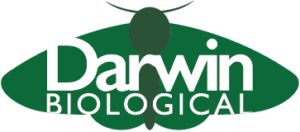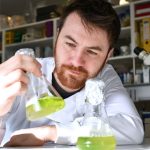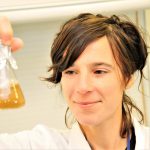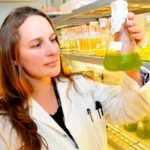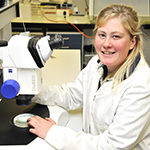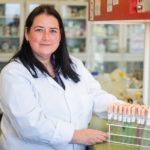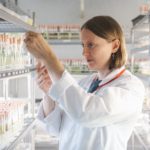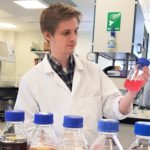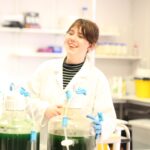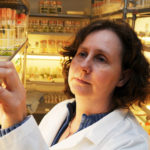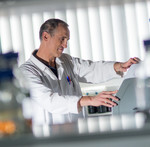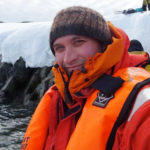About CCAP
The Culture Collection of Algae and Protozoa (CCAP) is a Biological Resource Centre located within the Scottish Association for Marine Science (SAMS) campus near Oban on the scenic west coast of Scotland. CCAP is supported by the Natural Environment Research Council (NERC), part of UK Research and Innovation, as a National Capability service.
We support researchers and businesses across the world with knowledge about the taxonomy and cultivation of algae and protozoa and provide starter cultures and growth media to a wide range of customers.
The Collection gained Quality Management Standard ISO 9001:2015 in April 2021.
Mission and Vision
Mission: To serve as a biological resource centre whose core activity is to access, maintain, characterise and distribute living cultures of marine and freshwater algae, cyanobacteria, protozoa, algal pathogens and related organisms; to provide taxonomy, technical and educational expertise, services and resources for culture isolation and curation to scientists, educators, researchers, and businesses worldwide; and to underpin research at SAMS.
Vision: CCAP will continue to be a recognised and trusted global leader in the provision of algae, protozoa and their associated organisms for academic research, educational institutions, businesses and commercial ventures, for the provision of training and related services. CCAP will be recognised for:
- First class customer service
- Outstanding intellectual capability; and
- World-leading online knowledge resources.
CCAP is working in partnership with:
NERC Environmental Omics Facility: www.neof.org.uk
NEOF is a partnership between world-leading labs at the Universities of Liverpool and Sheffield who have pooled resources and expertise to deliver state-of-the-art omics expertise, capability and training to UK environmental scientists.
Darwin Biological: www.darwinbiological.co.uk/
We supply algae and protozoa cultures to schools and colleges within the UK in partnership with Darwin Biological for use in teaching and practical classes. See our Darwin Biological page for more information.
CCAP staff
Affiliated colleagues
CCAP Steering Committee
CCAP receives guidance and input from a Steering Committee of experts in the fields of marine and freshwater science and biotechnology, both from academia and industry.
Current CCAP Steering Committee members:
- Professor Willie Wilson, University of Plymouth (Chair)
- Dr Gill Malin, University of East Anglia
- Dr Samantha Law, NCIMB
- Dr Maike Lorenz, Georg-August-Universität Göttingen
- Dr Andrew Spicer, Algenuity
- Professor Thomas Richards, University of Oxford
- Dr Carol Phillips, NCIMB
Our History
 The foundations of the Culture Collection of Algae and Protozoa (CCAP) were laid by Professor Ernst Georg Pringsheim, who isolated a number of cultures at the Botanical Institute of the German University of Prague in the 1920s before moving to England where the collection was expanded. In 1970 these cultures formed the basis of the Culture Centre of Algae and Protozoa at Cambridge, financed by the Natural Environment Research Council (NERC). During 1986 the cultures and their associated activities were transferred to the Institute of Freshwater Ecology (IFE) Windermere Laboratory at Ambleside [freshwater algae and all protozoa] and Dunstaffnage Marine Laboratory (DML) at Oban [marine algae]. These moves represented a relocation of the Centre to the two Institutes both with long-standing and continuing research activities in phycology, protozoology and other aspects of aquatic science. As the collection was now held at two locations rather than a single centre, it was renamed the Culture Collection of Algae and Protozoa, retaining the acronym CCAP.
The foundations of the Culture Collection of Algae and Protozoa (CCAP) were laid by Professor Ernst Georg Pringsheim, who isolated a number of cultures at the Botanical Institute of the German University of Prague in the 1920s before moving to England where the collection was expanded. In 1970 these cultures formed the basis of the Culture Centre of Algae and Protozoa at Cambridge, financed by the Natural Environment Research Council (NERC). During 1986 the cultures and their associated activities were transferred to the Institute of Freshwater Ecology (IFE) Windermere Laboratory at Ambleside [freshwater algae and all protozoa] and Dunstaffnage Marine Laboratory (DML) at Oban [marine algae]. These moves represented a relocation of the Centre to the two Institutes both with long-standing and continuing research activities in phycology, protozoology and other aspects of aquatic science. As the collection was now held at two locations rather than a single centre, it was renamed the Culture Collection of Algae and Protozoa, retaining the acronym CCAP.
In early 2004 the freshwater section of CCAP relocated to Scotland to join the marine section at the new Scottish Association for Marine Science (SAMS) laboratory near Oban on the west coast. CCAP, united once again as a single collection, occupies a custom-designed facility within the European Centre for Marine Biotechnology at SAMS.
CCAP still receives its major funding from the Natural Environment Research Council, part of UK Research and Innovation.
The Collection functions as the national service collection of algae and protozoa in the UK and is linked with other service collections worldwide via the World Federation for Culture Collections (WFCC). There is liaison between collections within Europe via the European Culture Collections’ Organization (ECCO) and nationally via the United Kingdom Biological Resource Centre Network (UKBRCN).



